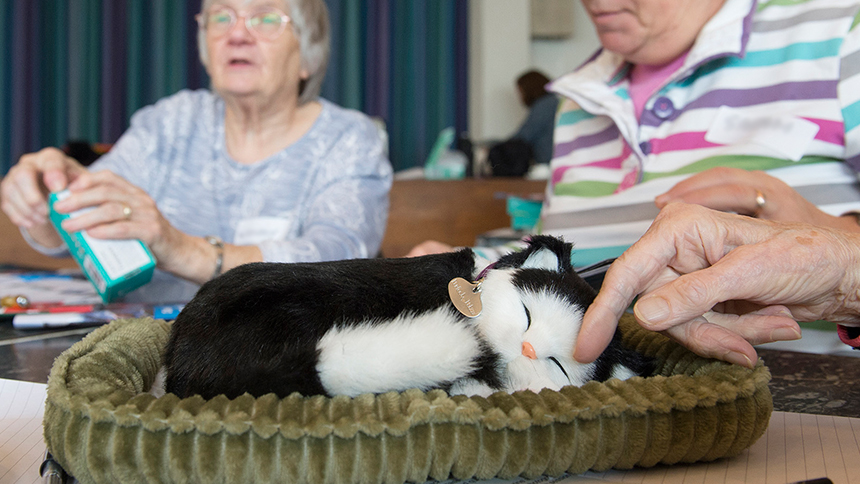Table of Content
This act of nurturing is a positive behaviour and doll therapy has proven useful for men as well as women. Read this article for more about the pros and cons of doll therapy for dementia and Alzheimer's patients. It can be tricky to know what to buy a loved one for a gift if they are suffering from a neurological condition such as Alzheimer's disease or dementia. We love to see them content and in a happy place, and anything we can do to promote this feeling of calmness and contentment is beneficial. The best gift by far is simply spending time with the person living with dementia.

Managing through COVID-19Dementia doesn’t stop and neither do we. To get you through these difficult times, we have developed these helpful resources. National resource libraryBrowse our resource library to learn more about dementia.
Give the Gift of Easier Dressing
The Alzheimer Society can provide you with the information and resources to help you manage your diagnosis, assert your rights, live well with dementia, plan for your future and more. Stigma not only hurts people living with dementia, it discourages their families from confiding in others or getting the support they need. On this page, learn how to recognize stigma against dementia.

First steps after diagnosisYou've likely been worried and anxious about the changes you're seeing in yourself. Now that you've been diagnosed, know that there are education and resources to support you. Programs and servicesPrograms and servicesThe Alzheimer Society can help you face dementia. Use this page as your guide to find support programs, dementia education and resources, referral services and more. Myths and realities of dementiaMyths and misconceptions about Alzheimer's disease and dementia abound – what it is, who gets it, and how it affects the people who have it.
gifts that seniors can cuddle and care for
Are very similar to fidget blankets, but they take the shape of a plush cushion or stuffed animal. They’re very portable and can come with attachments on one or both sides. Games and activities can help calm stress and anxiety, help reduce cognitive decline, and foster social connection, according to the Global Council on Brain Health. To learn more about the care and comfort we offer,find your nearest communitytoday. Socializing– those with late-stage dementia are often withdrawn from others, art therapy can allow them to socialize with others. You may feel odd visiting someone without bringing a gift, but your loved one would probably appreciate your company more than any item you bring.
In Alzheimer’s patients, red colored dining ware is found to increase food intake by 24% and liquid intake by 84%. This jumbo calendar is easy to see and understand and has plenty of space for making notes about appointments or special events. This 24-piece set includes wooden tools, nails, screws, nuts, and bolts. The large pieces are easier to grip and see and the pictures are vibrant and artistic – not at all childish. Use plain water to “paint” these colorful paintings and give a sense of accomplishment.
Gift ideas for people with dementia
A digital tablet will allow your loved one to keep track of important dates, the time and play games. Pair with a backup charger so they’re never without battery power. Set three family photos in the center of a striped fleece throw blanket. Curl up with the blanket for a cozy afternoon in to look at old albums and relax. This unique bookmark both holds the page and keeps the book from flipping closed as you read.
There are different stages of dementia, and gradual changes characterize them all. In fact, you may need to tell your loved one who you are throughout the visit. The visitor can leave a simple note that only includes the time and date of the visit. They might also jot down things they talked about, which might help subsequent visitors with conversation starters. Dementia patients sometimes are not able to accurately report visits they receive. For example, your mom may tell you that “a nice man stopped by,” and you might not know if that man was your brother, your son, or your mom’s minister.
Gift Ideas for Alzheimer’s & Dementia Patients
Can be an excellent gift for seniors who may be intimidated by or not able to use technology easily. This 10-button, corded picture phone includes an emergency button, and each button is a frame meant to hold the photo of a family member or friend. The phone is hearing aid compatible and ensures effortless communication. When shopping for a loved one with dementia, theAlzheimer’s Associationrecommends keeping in mind the stage of dementia your loved one is in. An essential oil diffuser can appeal to your loved one’s sense of sight and smell.
Make sure you know his preferences before making a purchase. Patients can make calls by touching a picture of a loved one. Our expert guidance can make your life a little easier during this time. Find out what to do and discover resources to help you cope. This digital clock has an 8-inch large-font screen display, 5 alarms, and clearly spells out the time, period of the day, full day of the week, month and date. This set includes a cup, inner lip plate, partitioned plate with lid, and adaptive grip fork and spoon.
These simplified music players are designed to be easy for people with cognitive impairment to use and have very few buttons or controls. Therapy dolls can provide comfort and help seniors feel useful and needed because they have something positive to focus on. This fun twisty fidget toy has a variety of textures and colors for tactile and visual sensory stimulation. It’s silent and calming to use so it won’t disrupt or disturb others.
They may struggle to put on over-the-head shirts, but at the same time they may find zippers and buttons difficult to maneuver. Understand your loved one’s limitations before purchasing an article of clothing for them. Search for active mind fidgets for seniors to find “toys” that your loved one can manipulate. These simple items are designed to give your loved one something safe to touch. “Sensory” items are popular in educational settings as teachers are learning more about how the taste, sound, smell, sight, and touch affect the thought process of students. It only makes sense that those sensory gifts may also be beneficial for a loved one with dementia.
Your mom may also not be able to remember if the visit was last week, month, or year. Your loved one may have a lot of hours to fill throughout the week. Although most nursing homes have planned daily activities, your loved one may need something to do to fill in the gaps. Gel seat cushions may be too large for a typical gift basket, but they may bring a lot of comfort to those who spend a lot of time sitting in a wheelchair or lifting recliner. Does your loved one have difficulty with the toileting process? Even if your loved one has memory issues, they may be loyal to a specific brand.

No comments:
Post a Comment